Over our years of helping small websites and companies grow and compete with the big guys, we’ve learned that the right business tools can make a huge difference in their success.
Whether you are looking for something to help you with email marketing, customer support, customer relationship management, or something else, there are plenty of plugins and software options that can fit the bill.
That’s why we’ve done the research and put together a huge list of the best business tools for small businesses. We’ve broken down everything into different categories so that you can find the best options for your needs.

Quick Pick: The Best Business Tools for Small Business
| Tool | Category | Price | Free Trial |
| Constant Contact | Email Marketing | $12 per month | Yes |
| Nextiva | Business Phone | $14.95 per month per user | Yes |
| Groove | Live Chat & Support | $16 per person per month | Yes |
| Gusto | HR & Payroll | $40 per month, plus $6 per month per additional user | No |
| HubSpot CRM | CRM | $90 per month per seat | Yes |
How We Test and Review Business Tools
Here’s how we reviewed different small business tools for this guide:
- Real-World Experience: At WPBeginner, we actively run small businesses of our own. We’re involved in starting new projects and managing existing websites, so we’ve used and tested these tools extensively ourselves. We ensure that they meet our high standards of reliability and ease of use.
- Comprehensive Research: We perform our own dedicated research to stay up-to-date on the latest developments in each category. We regularly update our recommendations accordingly, holding each tool to a high standard.
- User Feedback: We’ve combed through various third-party sites and even performed polls for users to see how they enjoy using these tools.
Why Trust WPBeginner?
At WPBeginner, we’re a passionate team with over 16 years of hands-on expertise in WordPress, design, and online marketing. Our mission is simple: deliver top-notch content and valuable resources to our audience. We achieve this by thoroughly evaluating and reviewing the plugins and software we actually use.
To learn more, see our complete editorial process.
Why Do You Need the Best Small Business Tools?
Running a business is no small feat. Luckily, there’s a wealth of online tools available to streamline your workflow and ease your burden. Choosing the right ones can feel overwhelming, though.
At WPBeginner, we’ve been testing and refining our top picks for years, keeping pace with the ever-evolving market. We’ve narrowed down our favorites to a curated list across various categories.
However, it can be a chore to figure out which is the right tool for your business.
Here are just a few reasons to add some of these small business tools to your repertoire.
- Increased Productivity: The right tools streamline business processes, automate repetitive tasks, and enhance overall efficiency. This leads to increased productivity among your team members, allowing them to focus on more strategic and value-added activities.
- Improved Collaboration: Many small business tools come with collaboration features that facilitate communication and teamwork. This is especially important in modern work environments where remote or dispersed teams are common. Collaboration tools enhance communication, file sharing, and task management.
- Enhanced Customer Experience: Tools such as a CRM (Customer Relationship Management) system help businesses manage customer interactions, track leads, and provide personalized services.
- Data-Driven Decision Making: Software with analytics and reporting capabilities provides valuable insights into business performance and customer journey. With accurate data at your fingertips, you can make informed decisions, identify trends, and adjust strategies to align with your business goals.
- Time and Cost Savings: Automation tools can significantly reduce the time spent on manual tasks, saving both time and money. You may have limited resources, so software that automates activities allows you to allocate resources more efficiently.
That said, it’s time to cover the best business tools for small businesses. Feel free to use the links below to jump to any section you need a solution for:
Email Marketing
Every business needs to build an email list. Sure, you could keep in touch with your customers via social media, but you don’t own the audience there.
An email list is something you own and can continually contact customers or leads anytime.
That’s why you need an email marketing service. These services allow you to send bulk automated emails to your subscribers. Not only that, you can segment users into groups, track their performance, and create marketing workflows.
1. Constant Contact

Constant Contact is the most beginner-friendly and fastest-growing email marketing service out there. It boasts an impressive 97% deliverability rate and offers a handful of time-saving automation that every small business could use.
Out of the many email service providers we’ve tried, we really like the user interface. From the moment you make your account, Constant Contact guides you through their simple process. You can create email newsletters, social media posts, landing pages, and events in minutes.
One of Constant Contact’s most unique aspects is its ability to segment the audience based on engagement level. Sure, it’s got all the standard segmentations, such as dividing contacts by location, membership, sales, email activity, and more.
That said, Constant Contact lets you segment your audience into four categories: most engaged, somewhat engaged, least engaged, and everyone else. For example, your most engaged customers could be your most loyal subscribers, to whom you can send upsell or cross-sell promotions.
WPBeginner readers can use our special Constant Contact coupon code to receive an additional 20% off.
Pricing: Plans start at $12 per month. If you need more storage, users, and advanced features, there are also higher-tiered plans.
Pros:
- Very affordable pricing
- It offers powerful integrations such as Facebook ads and eCommerce platforms.
- Constant Contact offers 200+ templates to fit your needs.
Cons:
- No advanced dynamic tags.
Why We Recommend Using Constant Contact: You can’t go wrong with Constant Contact as it’s good at just about everything. We especially like that they offer really outstanding customer support via live chat, email, phone calls, and community support, along with a large library of helpful resources. That way, you’ll always get your questions answered.
2. Brevo
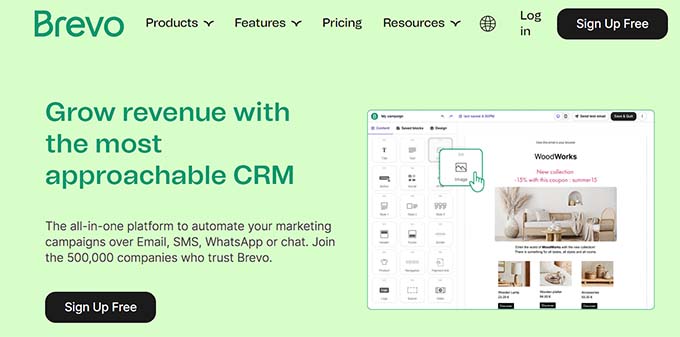
Brevo, formerly known as Sendinblue, is an email and SMS marketing software perfect for small businesses.
One of the best things about Brevo is that you receive unlimited email lists and contacts no matter which plan you choose. With contact segmentation, you can easily target smaller groups and engage them with relevant content.
Their advanced plans go well beyond just email marketing. They offer a sales CRM, live chat, landing page builder, and Facebook Ads integration. That means that for the price you are paying, you’re getting a lot more value than most email marketing services can offer.
Brevo is also known for high deliverability, guaranteeing up to 97%. That’s because they support many setup options, including email API, SMTP relay, webhook, and plugin. This means you can send bulk emails and have more control over your batch sends.
Pricing: Brevo is free to get started. However, their Starter plan begins at $25 per month and has unlimited contacts.
Pros:
- You will receive access to an unlimited number of contacts on any plan.
- A built-in CRM app is included.
- You can send advanced automation campaigns based on list-based behaviors.
Cons:
- You have to pay for a higher-tiered plan to get access to more advanced reporting features.
Why We Recommend Using Brevo: We like Brevo as an all-in-one marketing automation software that can do a little bit of everything. For instance, you can send timely SMS messages to promote your products and personalize them accordingly.
3. Drip
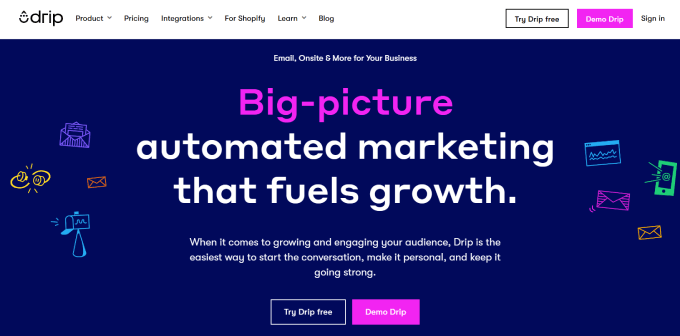
Drip is the best email marketing service for advanced users, especially for businesses looking to deliver hyper-personalized campaigns to their audience.
One of Drip’s standout features is its ability to create seamless workflow automation. The visual workflow builder makes it easy to visualize and customize user journeys.
When building your workflows, there are intuitive trigger options based on page visitors, tags, and other on-site behaviors that start the flow. Then, choose from dozens of actions to build the desired automation sequence.
If you’re running an online store, Drip offers integrations for WooCommerce, BigCommerce, and Shopify. That allows you to send strategically segmented campaigns to visitors and customers. For example, there are templates for just about everything, including cart abandonment emails and workflows.
Pricing: Pricing starts at $39 per month for up to 2,500 people on your email list. The price increases the more subscribers you have. All plans come with a 14-day free trial.
Pros:
- Drip has plenty of merge tags that dynamically replace content within an email based on the info you’ve collected in your contact or lead forms.
- You can A/B split test automation workflows to see which one performs better and ultimately provides the best conversion rates.
- It offers an eCommerce revenue attribution feature, so you know exactly how much revenue is generated from your email marketing campaigns.
Cons:
- Some learning curve is involved. For example, there are countless Liquid tags to learn about, which can be a lot of information if you’re used to using simpler email marketing services.
Why We Recommend Using Drip: At WPBeginner, we switched from MailChimp to Drip largely because of its more advanced segmentation and personalization features. That allows us to send more relevant and targeted campaigns to our readers.
For a more in-depth list of our favorite providers, check out our blog on the best email marketing services for small businesses.
Business Phone
While adding your mobile number to your WordPress site might seem convenient, it’s unprofessional and exposes your personal privacy.
That’s why you want to get a virtual business phone number and use a dedicated business phone service. This is a secure and professional solution. It allows you to:
- Make calls over the internet: Eliminate expensive phone bills.
- Use call forwarding, routing, and recording: Enhance team collaboration and capture valuable customer interactions.
- Track call metrics: Gain insights into wait times, hold times, and call duration to optimize your customer service strategy.
In essence, a business phone service is essential for any business that wants to improve customer service and effectively manage inbound and outbound calls.
4. Nextiva
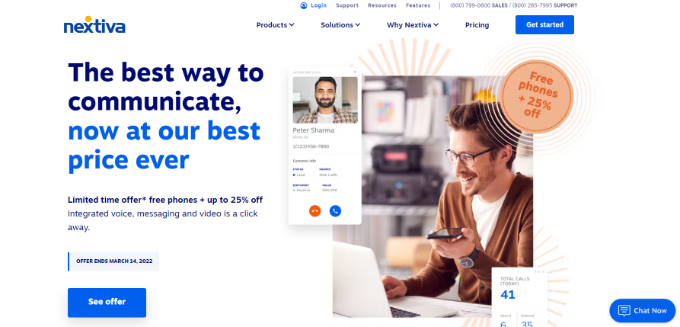
Nextiva is the best business phone service, and it makes it easy to manage communication between you and your customers.
The phone service is highly efficient and reliable, and you get helpful features beyond voice calling. There are plenty of features your call team can take advantage of, such as advanced call routing, voicemail to email and text, unlimited free domestic calling, text messages, and more.
Nextiva offers a treasure trove of data to help support your decision-making. You get critical information such as talk time, net promote score, first-time resolution rate, etc. Call center and sales team managers can easily interpret the data and come up with solutions to better improve performance.
If you’re using a traditional landline office phone system, Nextiva makes it easy to transition to a VoIP system. That means you can run your calls over the internet rather than complex landlines. They work with a variety of VoIP phones, headsets, and other call devices.
Pricing: Nextiva pricing starts at $14.95 per month per user for unlimited voice calling.
Pros:
- Nextiva provides 99.99% uptime for excellent reliability.
- They offer 24/7 customer support, so you always get the help you need.
- It’s an all-in-one phone system with a wide range of features to handle both outbound, inbound, and internal team communication.
Cons:
- Somewhat pricy, but the value is definitely there for what you pay for.
Why We Recommend Using Nextiva: Nextiva gives you everything you need to handle communication in your business. They offer a comprehensive set of VoIP service features that help you take your customer service to the next level. That way, your agents can work efficiently, and your customers can get their issues resolved quickly.
WPBeginner readers also get a special Nextiva Coupon to unlock an additional 21% off your purchase.
5. RingCentral

RingCentral is an affordable alternative to RingCentral that offers high-quality business phone services. Despite its cost-effective price, it doesn’t skimp out on quality.
With the entry plan, you get unlimited calls and texts, team messaging, file sharing, and other basic features you need. For smaller teams of 20 people or less, the $20 per user per month price point is a great deal.
We like the call routing capabilities, which allow you to direct callers to various departments and extensions. You can create and manage custom answering rules to ensure you get callers to the right people. You can even route the most important calls directly to your mobile device.
Pricing: Plans start at $20 per user per month, billed annually. Pricing varies depending on number of users and features available.
Pros:
- RingCentral comes with video meetings, team messaging, and screen sharing.
- It integrates with useful tools like Google Workspace and Microsoft, so you can easily connect data across platforms.
- You can enjoy a user-friendly interface that allows you to easily understand where and how to use all of its features.
Cons:
- You need to pay for the higher-priced tiers to get access to Interactive Voice Response (IVR) menu options.
Why We Recommend Using RingCentral: RingCentral is a good beginner-friendly option for small businesses just getting started with phone services. It lacks a few advanced capabilities that Nextiva has but gives you all the essential features needed for any business phone service.
The good news is that WPBeginner users get 33% off when they use our special RingCentral coupon code.
6. Ooma

Ooma is one of the top VoIP providers for small businesses. It offers virtual numbers, collaboration tools, call forwarding, voice mail, and more. It’s great for small businesses without IT teams because it provides everything you need in an easy-to-use way.
Ooma features a virtual receptionist feature, which is great for directing calls for your small business. You can easily set up a custom greeting, provide a menu of options that guides callers to the right departments, and send them to various extensions. It also helps to reduce the call load and average wait times, which your customers will appreciate.
Every Ooma plan has a mobile app so that your agents can easily answer or make calls while on the go. You can do all the important tasks, such as checking your voicemail, reviewing stats, and more.
That said, when comparing Nextiva vs. RingCentral and Ooma, this service isn’t ideal for call centers since it doesn’t support desk and conference phones.
Pricing: Plans begin at $19.95 per month per user. No contract is necessary, so you won’t be tied to a year-long commitment.
Pros:
- Ooma offers unlimited domestic calling in the US, Puerto Rico, Mexico, and Canada.
- Pricing is relatively affordable.
- Easy to use mobile app.
Cons:
- Missing a few advanced features unless you upgrade to the higher plans.
Why We Recommend Using Ooma: We like Ooma because it’s ready to use out-of-the-box. It requires zero technical installation, and just about everything is already configured when installed. They use an auto-configuration technology that automatically detects all the settings needed for your system to work.
You may want to also check out our full list of the best business phone services for small businesses.
Live Chat & Support
Live chat software is a tool that helps connect customers to an actual human support representative so that you can resolve their issues in real time. That way, your customers can get the answers they’re looking for quickly.
They’ll spend less time sifting through your knowledge base and waiting to find a solution.
This goes hand-in-hand with your business phone services. By offering live chats on your website, you provide a more omnichannel customer experience, reducing your call load and average handling time.
7. Groove
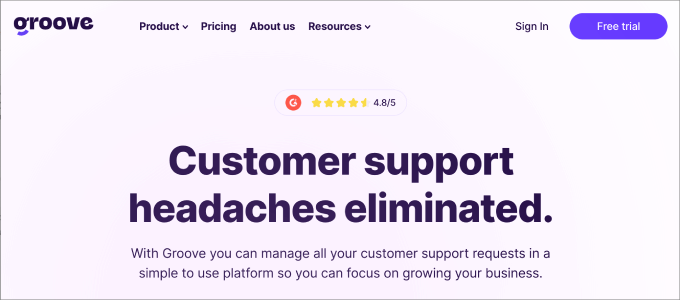
Groove is a popular help desk software used by big brands like HubSpot, AppSumo, AT&T, and CloudApp.
It offers all the essential features a small business needs to deliver fast and responsive customer service. These include a knowledge base builder, shared inbox, collaboration and reporting tools, and live chat support.
Using Groove, we quickly realized how accessible the software feels. Think of it like a simple inbox that manages all customer communication in one place. Each conversation can be assigned to specific team members, so it’s clear who’s responsible for managing each conversion. Even better, you can label and assign agents to conversations based on certain conditions, such as department or type of inquiry.
Sticking to the theme of simplicity, Groove makes reporting as easy to understand as possible. Rather than giving you a ton of analytics that may confuse small businesses, they stick to the most important options.
For example, some of the metrics include response time, agent performance, busiest times, customer feedback, number of customers helped, and number of resolutions.
Pricing: Starts at $16 per user per month, billed annually. There is also a free trial available.
Pros:
- Groove integrations with the most popular business tools like Shopify, Slack, and Mailchimp.
- The knowledge base builder is customizable, and there are time-saving AI writing tools to help you quickly create support articles.
- Live chat lets you deliver fast service to customers
Cons:
- Groove isn’t the most customizable in terms of layouts and themes.
Why We Recommend Using Groove: Groove ranks as our top choice based on its value and ease of use. The entire system is easy to adopt, so you can better manage your support reps without having to spend a lot of time training them on how to use the software.
8. Heroic Inbox
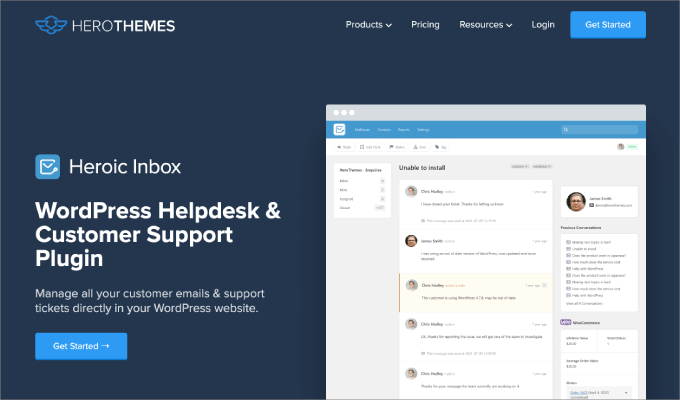
Heroic Inbox is the best WordPress-powered help desk and customer support market in the market. It allows you to easily manage customer emails and support tickets right within your WordPress site.
This can streamline workflow by keeping all support-related tasks in one place so you can respond to customer inquiries faster.
After testing the inbox, we found that it comes with all the features you’ll need to manage support emails. For instance, you can create canned responses, add notes to conversations, track your ticket history, and assign messages to team members.
Best of all, it pulls multiple inboxes into one place. Chances are, you may have various inboxes to respond to, such as sales, support, customer service, and partnerships. This allows you to ensure that an important message is never missed.
If you want to add knowledge base capabilities, then you’ll simply need to download Heroic KB, which gives you the ability to add a searchable knowledge base to your website.
Pricing: Starts at $199.50 per year.
Pros:
- Manages customer service inquiries directly in WordPress.
- You can connect multiple inboxes in one place.
- It offers the ability to add notes and assign tickets to users.
Cons:
- It doesn’t have live chat capabilities.
Why We Recommend Using Heroic Inbox: Juggling a lot of software can be a problem for a lot of small businesses. With Heroic Inbox, you can manage all inquiries in your WordPress dashboard. Since it lives within the WordPress ecosystem, it also seamlessly connects with other plugins, such as WooCommerce.
9. LiveChat
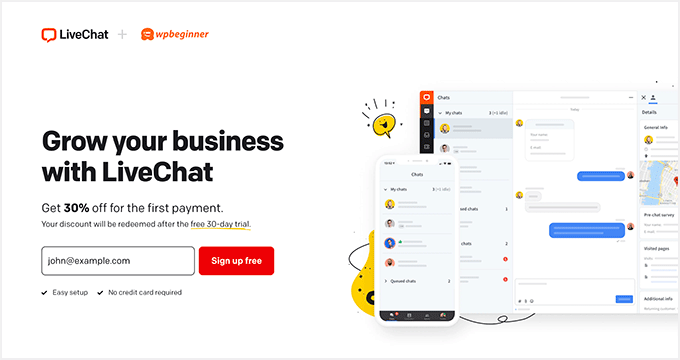
LiveChat is an all-in-one customer service software that works seamlessly for WordPress website owners. With over 35,000+ businesses that trust LiveChat, it’s a very popular tool for building live chatbots.
You can create a chatbot that asks the user questions before they’re automatically transferred to the right agent. During the chat, the agent is able to share files back and forth with the customer, send calendar links, or complete a purchase. On top of that, you can set up canned frequently asked questions type of responses to save time.
Beyond that, you can add pre-chat survey forms before and after each live chat session. That way, you’re able to evaluate your sales reps and customer support agents and how they’re performing.
It even integrates with popular tools like HubSpot, Zendesk, and Google Analytics, so you can better understand where your customers are coming from and who they are.
Pricing: LiveChat starts at $20 per person, billed annually, with higher-priced plans that track more users and better features. There’s also a free plugin available.
Pros:
- Plenty of integrations to seamlessly connect data across platforms.
- You can initiate a chat with a visitor as they are browsing on your site.
- There are lots of customization options to help users find a solution.
Cons:
- Price can quickly add up for large teams.
Why We Recommend Using LiveChat: LiveChat is an AI-powered help desk software that has a lot of advanced tools to help you sell more. For example, their custom forms, product cards, and AI automation can help turn inquiries into actual sales.
10. HubSpot Chat
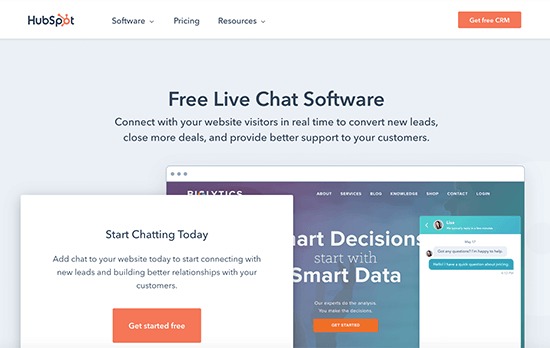
HubSpot Chat is an all-in-one marketing platform that also offers a chatbot builder and live chat feature.
You’re able to customize the live chat design to help route leads and customers to the right person on your team. The live chat widget can be edited to match the look and feel of your brand. You can even send targeted welcome messages on your live chat widget based on segments of your audience or different web pages.
The routing feature works during a chat, where your services team passes a lead to a sales rep. In addition, it provides useful automation features so you can deliver canned responses for faster response times.
Since HubSpot is an all-in-one tool, all chats are automatically stored in the CRM. That means your team will have a clear view of each customer interaction.
Pricing: It’s free to get started. But if you want the suite of marketing tools or CRM, you’ll need to buy the entire package. Prices vary based on what suite you choose.
Pros:
- HubSpot Chat is free to use.
- You can connect the tool to Slack so your team gets immediate notifications when a visitor requests to speak with your support team.
- You’re able to route leads to anyone on your team.
Cons:
- It’s missing advanced features such as post-chat survey forms.
Why We Recommend Using HubSpot Chat: We like HubSpot Chat because it offers all the essential features of live chat software and is absolutely free to use. That said, if you want more advanced automation or more sales-related features like product recommendations, then you may want to consider LiveChat or ChatBot instead.
11. ChatBot

ChatBot is the best helpdesk software for creating AI-generated answers to customer questions.
Where ChatBot stands out is its ability to build visual workflows that help customers get their questions answered and guide them to a sale. It comes with pre-built templates so that you can use them out of the box. For example, after a customer asks a question about a specific product category, you can immediately offer a limited-time discount to incentivize visitors to take action.
If site visitors want to chat with a real person, you can easily forward them to a live customer support representative. That said, the customization options are quite limited compared to LiveChat.
But, when it comes to AI automation, ChatBot can make your life easier. For example, depending on how users interact with your site and chatbot, you can add them to a segmentation and then import them to a CRM or email marketing service. This is great for nurturing leads and sending follow-up emails.
Pricing: Chatbot starts at $52 per month, billed annually or $65 month-to-month. However, there is a 14-day free trial, with no credit card required.
Pros:
- ChatBot saves time with its powerful and expansive automation features.
- It allows you to segment lists and trigger actions based on visitor behavior.
- It integrates with WooCommerce and WordPress.
Cons:
- ChatBot lacks high-level live chat features.
Why We Recommend Using ChatBot: If you want to automate your helpdesk and chat support, ChatBot is the way to go. It has many templates that help guide users into a sale.
Also, check out our expert picks of the best WordPress chat plugins.
HR & Payroll
Managing your team members is arguably one of the most important functions of a business. No matter what type of business you run, you’ll need to pay your employees and manage their hours.
With HR payroll software, you can automatically send out paychecks through bank direct deposit, manage PTO and bonuses, streamline employee onboarding, withhold a percentage for taxes, and more.
When your HR and payroll are organized, employees know what to expect, and you don’t have to worry about running into tax compliance issues.
Best of all, HR software streamlines all the tedious admin tasks that you would otherwise have to do by yourself.
12. Gusto

Gusto is the best payroll and HR software that helps you automate both basic and advanced payroll tasks for employees and contractors. With its beginner-friendly approach to payroll management, it’s definitely a tool to have in your corner to ensure everything runs smoothly.
Even if you’re a small business without a full accounting team, Gusto makes it easy to handle payroll. It automatically runs payroll for you as many times a month as you need, and taxes are filed automatically. In addition, it automatically syncs health insurance, workers’ compensation, time tracking, 401K, PTO, and more.
Besides payroll, Gusto makes hiring and onboarding a breeze. There are features like custom offer letters, onboarding checklists, document signing, and even software account creation.
Pricing: Gusto starts at $40 per month, plus $6 per month per additional user you add.
Pros:
- Relatively affordable to use.
- Very beginner-friendly for both business owners and employees.
- Gusto is a self-service tool for employees where they can hop online to check their pay stubs and important documents and request time off without the need for HR to intervene.
Cons:
- Gusto is only available in the United States.
Why We Recommend Using Gusto: Gusto is an all-encompassing tool for payroll and HR tasks. You don’t have to worry about the nitty-gritty tasks like filing payroll and tracking all the taxes withheld. Plus, its higher plans offer next-day deposits, so employees get paid faster.
13. BambooHR

BambooHR is an excellent HR software and payroll solution for small businesses. The program is better suited for human resource tasks like compensation, hiring, onboarding, and company culture.
Inside, you get an application tracking system (ATS) that helps you speed up the hiring process and weed out potential applicants who don’t meet the job role requirements. Its automated alert features ensure you stay on schedule and keep candidates in the loop during the hiring process.
Once you’ve made your decision, you can use one of the many offer letter templates that come with auto-fill features so the new hire can sign and accept everything digitally.
That said, Bamboo HR also does all of the essential payroll tasks. It automates tax filing, so you don’t have to do it manually. As a result, you’ll avoid tax penalties and ensure you accurately report your employee earnings and taxes withheld.
Pricing: BambooHR offers free pricing quotes. To receive customized pricing, you will need to complete their contact form.
Pros:
- BambooHR offers self-service tools so employees can access information such as tax forms and pay stubs online.
- It automates the payroll process to avoid mistakes.
- The ATS makes hiring much easier and faster.
Cons:
- BambooHR is not as contractor-friendly as Gusto since it doesn’t have many features that cater to freelancers.
Why We Recommend Using BambooHR: BambooHR is a great choice if you have a remote team based internationally (outside of the U.S.). It makes it easy to manage your hiring and payroll across multiple countries.
14. QuickBooks

QuickBooks is a payroll software designed to make life easier for small business owners. It’s primarily used for accounting tasks, allowing you to calculate all your balance sheets and perform payroll.
One key area where QuickBooks shines is that it offers same-day or next-day direct deposit processing, depending on the plan you choose. You also get useful features such as automated tax calculations and payroll, business receipt capture, paycheck creation, and more.
There’s a dedicated mobile app, so employees can easily access their PTO and health information and even look into their paystubs on the go. For administrators, you can manage payroll from anywhere, ensuring your team never misses payday.
Pricing: Price starts at $37.50 per month, plus an additional $6 per additional employee per month.
Pros:
- Quickbooks offers a 30-day free trial.
- For Elite users, QuickBooks Payroll provides a tax penalty protection of up to $25,000 per year.
- QuickBooks Payroll integrates with QuickBooks Online, meaning you get a payroll and accounting system in one.
Cons:
- There are limited third-party integrations.
Why We Recommend Using QuickBooks: If you’re focused on getting your accounting and payroll right, then QuickBooks is the way to go. With the tax penalty protection, you’re getting great coverage. That means if you make an error, they’ll not only help you to fix the issue but also cover any penalty and interest fines along with it.
For a more comprehensive list, read our blog post on the best payroll software for small businesses.
CRM
Juggling customer data across scattered Excel sheets can be chaos. You may deal with missed follow-ups, forgotten birthdays, unsent emails, mixed signals, and frustrated teams and customers.
CRM apps eliminate this nightmare. They consolidate all customer data into a single, accessible platform. This empowers your sales, marketing, and customer support teams to:
- Effortlessly access information: No more scrambling for details.
- Personalize the customer journey: Deliver targeted experiences based on customer history.
- Boost efficiency: Automate tasks and free up time for strategic work.
Sales reps can prioritize high-value opportunities and close deals faster. Plus, marketers can leverage customer insights to craft impactful campaigns. Customer support gains a complete view of each interaction, providing exceptional service every time.
15. HubSpot CRM
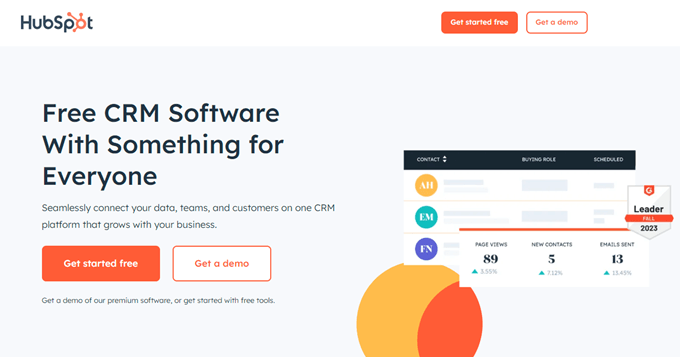
HubSpot CRM is the most popular CRM software on the market. It is cost-effective and offers a wide range of features, making it a great choice for most small businesses. You can get started with the free plan, which already gives you access to unlimited users and contacts.
Where HubSpot excels is its all-in-one capabilities. Since it combines sales, marketing, customer service, CMS, and operation hubs, you can easily connect data between departments. For example, you can easily pass contacts from your marketing team to the sales department without having to sync information to another system.
HubSpot is also really easy to navigate. It provides a full picture of customer interactions and comes with customizable reporting dashboards so that you can see how your team is performing. By looking at the opportunities and deal stages, you can quickly see what’s currently in the pipeline and focus on high-leverage prospects who are ready to buy.
Pricing: Hubspot CRM is free to get started. If you want the entire marketing suite, it’s $800 per month for 3 seats, billed annually, and an extra $45 per month per additional user. HubSpot Sales suite costs $90 per month per seat.
Pros:
- HubSpot has an easy-to-use interface.
- There are tons of features and even apps that you can download to make your experience better.
- Visual dashboards and reporting make it very easy to track team performance and spot opportunities for growth.
Cons:
- While HubSpot has a very generous free plan, its pricing gets steep quickly if you wish to upgrade.
Why We Recommend Using HubSpot: HubSpot is one of those can’t-miss tools for beginners. Sure, it could be more customizable or offer more affordable plans. But with that said, its free plan is enough to get small teams started.
16. FunnelKit Automations
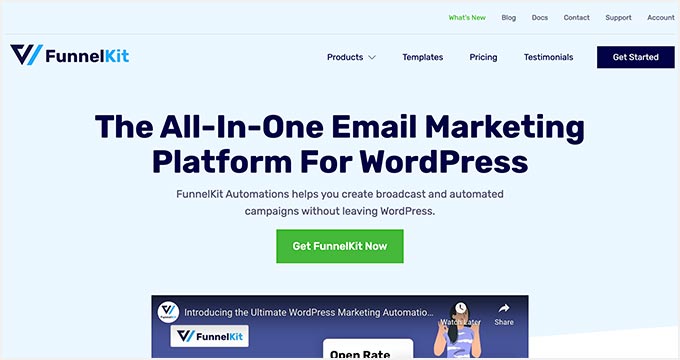
FunnelKit Automations is the best CRM and marketing automation engine for WooCommerce. It’s filled with a wide range of features to help get your online more repeat sales and higher order values.
Geared towards e-commerce business owners, you have a complete 360-degree contact view of your customers. You’ll be able to see their name, gender, email, tags, lists, geographical location, and custom field data.
In addition to the CRM tool, you can build high-converting checkout pages and flows. The drag-and-drop builder connects with other major page builders, such as Divi, Elementor, Oxygen, and Gutenberg.
Once customers complete the purchase, you can create upsell pages to showcase higher-tier products, increasing your total order value.
Pricing: FunnelKit starts at $99.50 per year. That said, there is a free version as well.
Pros:
- You get plenty of automation templates and workflows to increase conversions.
- You can view the customer’s complete profile, including purchase history, order placed, etc.
- Everything can be tracked, including what pages and workflows led to revenue.
Cons:
- You’ll need a mailer plugin, such as WP Mail SMTP, since WordPress isn’t built for high-volume email.
Why We Recommend Using FunnelKit Automation: If you’re running an online store, adding FunnelKit Automation is a no-brainer. Keep your opt-in leads and customers organized so that you can send them more relevant product recommendations.
17. Pipedrive

Pipedrive is a sales-focused CRM app for small businesses. It’s an all-in-one sales platform to boost revenue and track all of your leads and customers.
What we like about Pipedrive is its smart, in-platform tips. It comes with a sales assistant that provides performance tips and recommended features to help your team get acclimated to the software. For example, if you’re not sending follow-up emails after demo calls, it might send reminders to your reps.
Pipedrive goes beyond simple CRM with powerful automation features. Imagine automatically nurturing leads with timely emails, assigning tasks, and moving deals through your pipeline.
These automated workflows free up your sales reps to focus on closing high-value deals, not repetitive tasks.
Pricing: Pipedrive begins at $14 per seat per month, billed annually. But there’s a free 14-day trial you can get started with.
Pros:
- Fairly affordable to use.
- The smart assistant feature helps you improve your team performance.
- It has a lead enrichment feature, which scrapes data online to find information about your prospects based on the email you’ve collected.
Cons:
- It lacks phone support.
Why We Recommend Using Pipedrive: If you want a comprehensive sales tool to help manage your leads and drive home more revenue, Pipedrive is a solid choice. They offer many AI-powered features to make your life easier and save a lot of time.
If you want to learn about other options, check out our list of the best CRM apps for small businesses.
Bonus Small Business Tools
Aside from these top business tools that we mentioned above, we also use and recommend the following plugins to better manage our WordPress sites.
- WPForms is the most beginner-friendly contact form plugin used by over 6,000,000 sites. It features an intuitive drag-and-drop form builder, allowing you to build beautiful contact forms, payment forms, user registration forms, multi-page forms, and more.
- All in One SEO is a WordPress SEO plugin that helps you improve your WordPress SEO. It provides powerful on-page SEO optimization tools to help search engines better crawl and index your site, among many other capabilities.
- SeedProd is the ultimate drag-and-drop page builder plugin for WordPress. With this software, you can design high-converting and beautiful pages that convert visitors into leads and leads into customers. You can create everything from landing pages and custom home pages to 404 pages and more.
- MonsterInsights is the best Google Analytics plugin for WordPress. It brings the power of Google Analytics right to your WordPress dashboard, so you can get detailed reports of important metrics to see what’s working and what could be improved.
- OptinMonster is the best lead generation and popup plugin that helps you convert website visitors into subscribers and customers. With this tool, you can create a wide range of campaigns, including popups, scroll boxes, floating bars, and fullscreen welcome mats.
- MemberPress is a popular WordPress membership plugin for building membership websites. It has advanced membership features, including the ability to create gated content, add member levels, accept payments, create members-only forums, and more.
- PushEngage is a web push notification software that helps you engage and retain visitors once they’ve left your site. When users leave, you can send them all types of reminders, such as product announcements, blog post notifications, cart abandonment reminders, and more.
- RafflePress is a WordPress giveaway and contest plugin that lets you run all sorts of competitions. For example, you can run a giveaway to grow your email list.
- WP Mail SMTP is the best WordPress SMTP plugin for improving the deliverability and security of your emails.
- WP Simple Pay is the best Stripe payments plugin for WordPress. It allows you to easily create payment forms or buttons that accept 13+ payment methods and collect recurring payments.
- Smash Balloon is a social media feeds plugin for WordPress websites. It allows you to display custom Facebook, Instagram, Twitter, and YouTube feeds on your site to boost followers and engagement.
- WooCommerce is the world’s most popular eCommerce platform. It is cost-effective, super-flexible, and easy to use for beginners. You can easily create product pages, accept payments, manage orders, and much more. Basically, you can create your entire online store from scratch.
Frequently Asked Questions About Business Tools
What should you look for in a business tool?
The most important factors to consider when selecting a business tool are:
- Integration with WordPress: If you own a WordPress site or WooCommerce store, you’ll want a business tool that easily connects the platforms. That way, no crucial information is lost in translation.
- Ease of Use: The tool should be user-friendly and have an intuitive interface. Small businesses often have limited resources and may not have dedicated IT personnel, so it’s essential that the tool is easy for anyone on the team to use.
- Scalability: Will it be able to grow with your business? Make sure the software can accommodate increasing data, users, and business complexity.
- Cost-effectiveness: Evaluate the cost of the software pricing and its value for your business. Consider both upfront costs and ongoing fees. Some tools offer scalable pricing plans, which can be beneficial for small businesses.
- Feature Set: Identify the specific features that are essential for your business. Whether it’s task management, CRM, eCommerce capabilities, or content marketing, make sure the service aligns with your business needs.
- Customization: Look for a tool that allows some level of customization. This ensures that the tool can be adapted to meet your business’s unique requirements.
- Customer Support: Reliable customer support is crucial. Check the availability, response times, and level of support provided. This is especially important when technical issues arise.
- Security: Security is vital, especially when dealing with customer data. The tool should adhere to industry security standards and have measures in place to protect your business and customer information.
- Mobile Compatibility: With an increasing number of users accessing websites through different devices, the software should be mobile-friendly.
- Community and Reviews: Check for testimonials and user feedback to gain insights into the experiences of other small businesses using the tool.
- Data Backup and Recovery: Make sure the software has reliable data backup and recovery mechanisms to prevent data loss in case of unexpected events. That said, if you don’t already have a WordPress backup plugin, Duplicator is our go-to recommendation.
Do business tools integrate with your WordPress site?
Yes, the best WordPress plugins should seamlessly integrate with the most popular third-party business tools. However, if there isn’t an integration, we recommend using Uncanny Automator.
It is the best automation plugin, allowing you to create unlimited automated workflows in WordPress. That means you can connect your website to a specific tool to complete an action.
Let’s say every time someone completes your contact form, you want to automatically add those contacts to your prospects list to your CRM tool. You can create an automated workflow through Uncanny Automator that will easily execute that action for you.
Are there any free business tools available?
Yes, many of these tools offer a free version with limited features. That means you can test the product and see if it meets your needs. That said, you can also check out our list of the best free business tools for small businesses.
We hope this article helped you find the best business tools for small businesses. You can also check out our list of the must-have WordPress plugins for business websites or our guide on the proven ways to make money online blogging with WordPress.
If you liked this article, then please subscribe to our YouTube Channel for WordPress video tutorials. You can also find us on Twitter and Facebook.
The post 29 Best Business Tools for Small Business (Expert Pick for 2024) first appeared on WPBeginner.
from WPBeginner https://ift.tt/wCuMBF4
More links is https://mwktutor.com
No comments:
Post a Comment